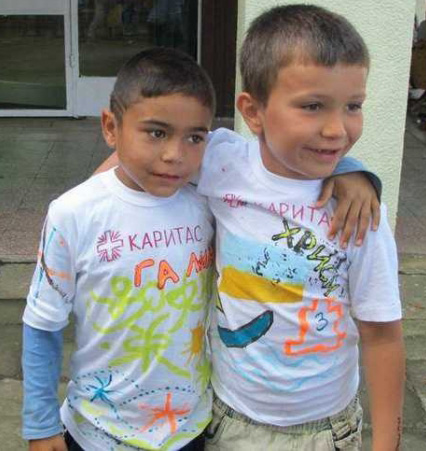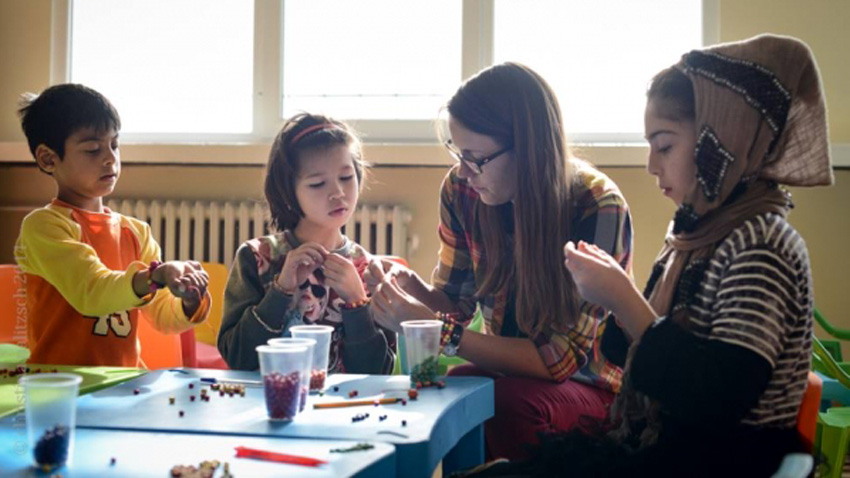As long as the state continues to be negligent of its responsibility to refugees, not to mention the repeal of the ordinance on their integration, Bulgaria runs the risk of being penalized by the EU. As long as the prosecutor’s office refuses to take to task the nationalists for their excesses – driving families with refugee status out of the country, sowing hatred between Bulgarians and foreigners, the integration of migrants and any improvement in their lives in this country is entirely in the hands of NGOs.
Volunteers are set to enter schools in Sofia this month, to help refugee children learn the Bulgarian language. This is the latest Caritas-Sofia programme regarding fugitives from war.
 “Caritas-Sofia has several projects and one refugee and migrant integration centre, called St. Anna,” says Diana Nedeva, coordinator of “Volunteers” at the organization. “We work with children and adults at the registration and reception centres as well as with people living at outside addresses. Our latest project involves sending volunteers to help refugee children learn the Bulgarian language. For the time being, this is a project that will only be implemented in Sofia, at the schools attended by refugee children. The volunteers will spend 60 minutes teaching them Bulgarian at least once a week. These children most certainly need this additional support, as Bulgarian is not their mother tongue, while some have only just arrived in this country. This language training will take place either before or after classes, with the volunteer meeting with one or several children at the same time, depending on their age or on their number at a given school. They will take an individual approach in every single case, so as to organize their teaching class better.”
“Caritas-Sofia has several projects and one refugee and migrant integration centre, called St. Anna,” says Diana Nedeva, coordinator of “Volunteers” at the organization. “We work with children and adults at the registration and reception centres as well as with people living at outside addresses. Our latest project involves sending volunteers to help refugee children learn the Bulgarian language. For the time being, this is a project that will only be implemented in Sofia, at the schools attended by refugee children. The volunteers will spend 60 minutes teaching them Bulgarian at least once a week. These children most certainly need this additional support, as Bulgarian is not their mother tongue, while some have only just arrived in this country. This language training will take place either before or after classes, with the volunteer meeting with one or several children at the same time, depending on their age or on their number at a given school. They will take an individual approach in every single case, so as to organize their teaching class better.”
Though it is not known exactly how many refugee children go to school, according to State Agency for Refugees data from the end of last year, out of the total of 2,000 minors at the refugee centres, only 55 attend school. The Catholic Church charity organization says that refugee children are not getting enough support in learning the Bulgarian language. That is why help, they say, must come from us all – it is enough to devote just a little time to help just one child do his or her homework and sit down and have a conversation with them. “Another problem refugee children frequently face is hostility from their classmates. The Bulgarian children and their parents need to be talked to so as to dispel prejudices, because it is lack of information that breeds fear,” says Margarita Spassova, coordinator of “Refugees” at Caritas. “In this sense, it is very important to involve the local community in the integration activities, including volunteer projects,” she adds.

“Our volunteers are people with different kinds of education, different professions and they are not all Bulgarian – for example, we have foreign students in Sofia and it is really important that they all work for one, single cause. Because in their contacts with asylum seekers they get to learn all sorts of things and find out that much of what they read or hear is not actually true. They are given an incredible opportunity for cultural exchange, for meeting the real, breathing people behind the statistics. And then these same people spread this information among friends and relatives and that goes a long way to break the stereotypes that are so widespread among the public.”
Though a small community in this country, the Catholic Church with its charity organization Caritas has been showing compassion for the people fleeing from war. We can only ask ourselves when the Christian Orthodox Church will follow suit.
English version: Milena Daynova
Photos: provate libraryOn this day 35 years ago, the authoritarian regime of communist dictator Todor Zhivkov collapsed. To mark the anniversary, the BGNES news agency carried out a survey of monuments to totalitarianism. The agency checked whether the monuments of the..
Residents and guests of the village of Kolena, Stara Zagora Municipality, gather for the Young Wine Festival. The event was celebrated for the first time in 2017, and a few years later the local teacher and winemaker Martin Slavov gave the..
The tallest Ferris wheel in Bulgaria will rise above Pleven , announced regional governor Nikolay Abrashev. It will be built in a multifunctional complex near the Kaylaka Park. "The project envisages the construction of a Ferris wheel with a..

+359 2 9336 661
